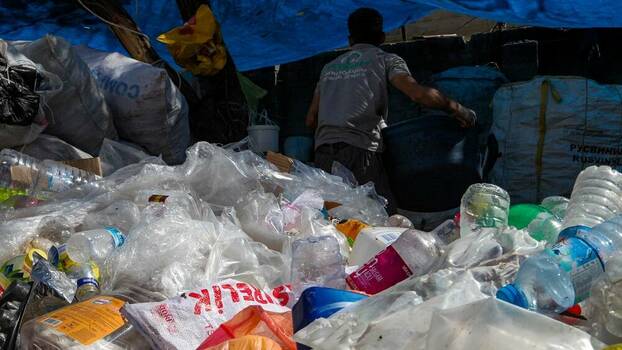
Turkey’s plastic waste problem first came to public attention in 2018. Since then, many investigations revealed the gravity of the problem: illegally dumped plastic waste threatening lives, and contaminating soil and water. Pollution is especially grave in harbour cities such as Adana, Izmir, and Istanbul, where plastic waste is mostly imported from EU countries and the UK.
After China banned plastic waste imports, Turkey filled the void. But reports show that the handling of plastic waste is far from sufficient: false reports on the type of imported plastics, no transparency from the plastic recycling companies, no proper tracing system, reports of mafia involvement, and images of plastic waste illegally burnt are rife.
Zozan Baran is an activist and independent scholar of Kurdish descent from Turkey. She obtained her BA from Boğaziçi University’s Political Science Department and her MA from the Free University of Berlin’s Sociology Department. She currently resides in Berlin and writes on political regimes and movements from a comparative perspective.
On the international level, there have been some improvements regarding the plastic and hazardous waste trade in recent years. In 2019, plastic waste was included in the scope of the Basel Convention. The EU regulated the plastic waste trade in December 2020, introducing a total ban on exporting certain types of plastics to non-OECD countries and conditioning its export to OECD countries to prior informed consent procedure.
Recycling is the common framework for exporting plastic waste, but only a small portion of the exported plastic is recyclable, and an even smaller portion is actually recycled. The truth is, plastic recycling is economically and environmentally cost-intensive. Hence, its trade raises serious concerns about the rights of people in importing countries.
Turkey is one of those countries, where mismanagement of plastic waste creates serious problems for the affected populations. As an OECD country, even with the recent EU ban, Turkey will continue to import plastic waste.
Following the reports, the Turkish authorities promised a new law banning mixed plastic and polyethylene, which was reportedly used as a cover-up for more hazardous plastics. This law was annulled in July 2021, only a few days after it entered into force. The decision came after a meeting between industry representatives and the government.
Despite government and industry claims that these facilities are closely monitored and their code of conduct complies with regulations, a recent Human Right Watch (HRW) report documents severe human and labour rights violations caused by plastic waste facilities. According to the report, child labour is used, although Turkish laws ban child employment in hazardous environments. Adult workers are also mostly from vulnerable groups, such as refugees and undocumented migrants. Moreover, the companies do not fulfil their liabilities in terms of providing the necessary protective equipment and health care service. As the facilities are located dangerously close to the residential areas, they also cause health problems for the residents, such as respiratory difficulties.
Despite these severe consequences, not to mention the international and national attention, in Turkey little political attention has been paid to the problem. The People’s Democratic Party (HDP) tabled a parliamentary motion on dumped plastic waste demanding investigation of the possible environmental and health damages caused by plastic waste in the Adana region, which was rejected by MPs from the Justice and Development Party (AKP) and Nationalist Movement Party (MHP). The Republican People’s Party (CHP) also raised the problem a few times through its Adana representative.
In addition to this, other left-wing parties such as the Workers’ Party of Turkey’s (TIP) Adana branch and the Communist Party (TKP) issued statements, demanding the closure of facilities and banning of plastic waste import. However, none of those statements have led to broader mobilizations. The only protests were organized in Adana by local citizens’ initiatives, professional associations, and environmental groups.
This situation is curious for several reasons: A similar environmentally dangerous practice recently sparked much protest and mobilization, which successfully prevented the scrapping of a toxic warship in Izmir. There has also been increasing environmental mobilization in Turkey in recent years. Plastic waste import also stands in the intersection of governmental mismanagement, anti-capitalism, and anti-imperialism. These are traditional issues for the Left. Yet, so far neither left-wing parties nor the broader public have mobilized against these practices.
This silence has interrelated reasons. First, protest mobilization is generally weak in Turkey as a consequence of increasing government oppression. Moreover, the affected populations (children, undocumented migrants, villagers, refugees) are extremely disenfranchised, and although some left-wing organizations make more of an effort to build relations than others,[1] their connection to the Left is weak. Hence, the Left does not feel immediate pressure to take ownership of the issue.
On top of that, plastic recycling is not enforced in Turkey, and the general public pays little to no attention to the topic. Another reason is probably that the plastic waste imports are very diverse. Unlike stopping the arrival of one warship, it requires sustained attention and mobilization. For this, the Left is currently not organized enough, especially not among populations that are affected by plastic pollution.
Finally, the opposition around the CHP-aligned Nation Alliance limits the oppositional agenda to elections and buffers any dissatisfaction that normally leads to mobilization. In this environment, the Left’s agenda, too, is very much limited to more “political” issues.
All these limitations, then, lead to weak mobilization and little attention to plastic pollution and plastic waste import in Turkey. That is not only deplorable because it could invigorate an anti-capitalist environmentalist agenda should the Left embrace the issue as one of its own. It also leads to a dangerous silence, which consequently allows the wealthy nations to continue exporting their plastic waste, despite much talk about environmental justice and mitigating climate change. This negligence allows “business as usual” and hinders the possibility to find a just solution to today’s accelerating environmental problems.
[1] The HDP, for example, has more such connections among its Kurdish constituents than other left-wing groups.